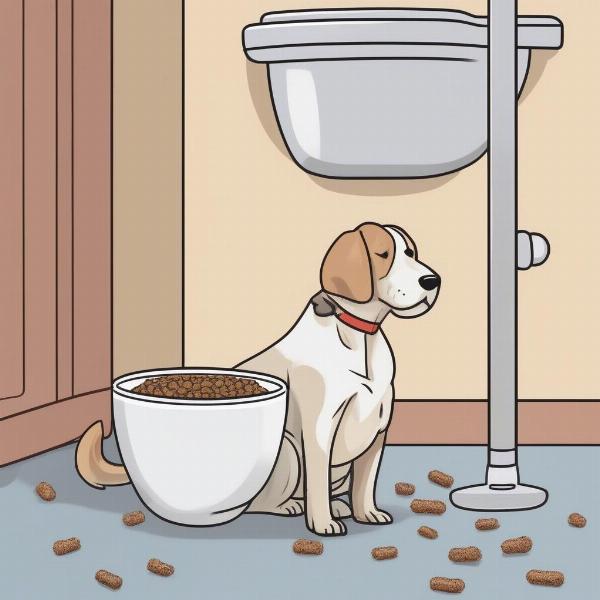The “pooping dog puzzle” can be a frustrating experience for any dog owner. Whether your furry friend is a new puppy or a senior companion, unexpected accidents or changes in their bathroom habits can be concerning. This guide will help you understand the potential reasons behind your dog’s pooping behavior, offer solutions, and give you the tools to crack the code.
Why is My Dog Suddenly Pooping More Frequently?
Changes in diet, stress, or underlying medical conditions can all contribute to increased bowel movements. A sudden switch to a new dog food can upset your dog’s digestive system. Similarly, anxiety caused by a change in routine, a new pet in the home, or even loud noises can manifest in digestive issues. More serious causes include parasites, inflammatory bowel disease, or even certain cancers.
 Dog pooping frequently due to diet change
Dog pooping frequently due to diet change
If your dog’s increased pooping is accompanied by other symptoms like vomiting, lethargy, or blood in their stool, it’s crucial to consult a veterinarian immediately.
The Stressful Poop: Anxiety and Your Dog’s Bowel Movements
Dogs, just like humans, can experience stress and anxiety which can affect their digestive system. Moving to a new home, the introduction of a new family member (human or animal), or even loud noises like fireworks can trigger stress-induced pooping. Identifying and mitigating the source of stress is key to resolving the issue.
Creating a calm and predictable environment for your dog can help alleviate stress. This includes maintaining a consistent daily routine, providing a safe space for your dog to retreat to, and using positive reinforcement training to build confidence. old dog keeps pooping in the house
Dietary Dilemmas: Food and Your Dog’s Poop
The type and quality of food you feed your dog directly impacts their digestive health. Low-quality food filled with fillers and artificial ingredients can lead to inconsistent bowel movements and even diarrhea. On the other hand, a high-quality, balanced diet tailored to your dog’s age and breed can promote healthy digestion and regular, firm stools.
If you’re considering changing your dog’s food, do so gradually to avoid upsetting their stomach. Mix the new food with the old over a period of several days, gradually increasing the proportion of new food. Always ensure your dog has access to fresh, clean water.
Medical Mysteries: When to Seek Veterinary Help
While many cases of unusual pooping behavior can be attributed to diet or stress, some indicate more serious underlying health issues. Parasites, infections, inflammatory bowel disease, and even certain types of cancer can affect a dog’s bowel movements.
Dr. Emily Carter, DVM, a leading veterinary gastroenterologist, advises, “Any sudden or significant change in your dog’s pooping habits, especially if accompanied by other symptoms like vomiting, lethargy, loss of appetite, or blood in the stool, warrants immediate veterinary attention.” Early diagnosis and treatment are crucial for managing these conditions effectively.
Conclusion
Understanding the “pooping dog puzzle” requires careful observation and consideration of various factors. By paying attention to your dog’s diet, stress levels, and overall health, you can often identify the root cause of the problem and implement appropriate solutions. Don’t hesitate to seek professional advice from your veterinarian if you’re concerned about your dog’s health.
FAQ
- How often should a healthy dog poop? Most healthy adult dogs poop once or twice a day, but this can vary depending on diet, age, and activity level.
- What does healthy dog poop look like? Healthy dog poop should be firm, but not too hard, and a chocolate-brown color.
- Is it normal for my dog’s poop to change color? Slight variations in color can be normal depending on diet. However, significant changes, especially black or bloody stools, warrant veterinary attention.
- How can I prevent my dog from pooping in the house? Establish a regular potty schedule, provide positive reinforcement for outdoor elimination, and clean up accidents thoroughly to eliminate odors.
- Can stress really cause a dog to poop more? Yes, stress and anxiety can affect a dog’s digestive system, leading to increased or irregular bowel movements.
- What should I do if my dog is pooping more than usual and seems unwell? Consult your veterinarian immediately for a diagnosis and treatment plan.
- What are some signs that my dog might have a digestive problem? Signs include vomiting, diarrhea, constipation, loss of appetite, weight loss, and changes in stool consistency or color.
Further Reading on ILM Dog
While this article provides a comprehensive overview of the pooping dog puzzle, you may find these additional resources helpful:
About ILM Dog
ILM Dog is your trusted global resource for all things canine. We’re passionate about providing dog owners worldwide with expert advice on dog breeds, health, training, nutrition, grooming, and much more. From puppy care to senior dog support, we offer practical, reliable information to help you navigate every stage of your dog’s life. For expert advice on dog breeds, health, training, nutrition, and grooming, contact us at [email protected] or call +44 20-3965-8624. Let ILM Dog be your guide to a happy, healthy dog.